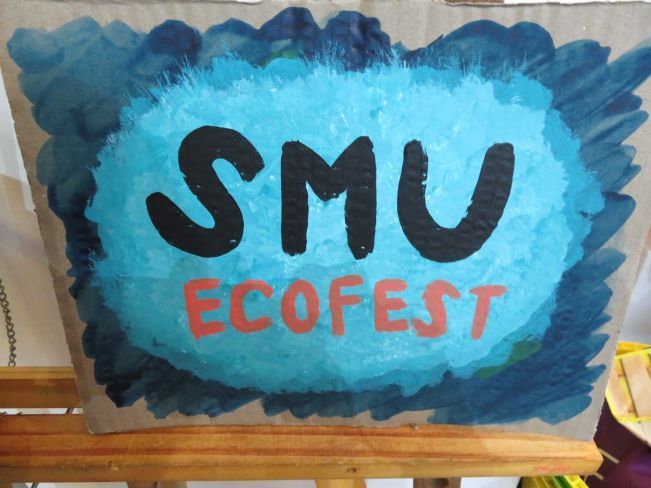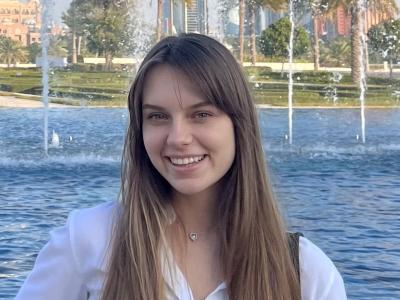
Members of the SMU community had the opportunity to hear from “ecopreneurs” and gain insights into different ways to tackle climate change, at the launch of the very first SMU EcoFest on 23 August 2019.
The festival took place at the SMU basement concourse, featuring a series of eco-centered talks and workshops from a range of advocates, businesses and NGOs. Besides browsing the visuals and literature available on display at the booths lining the basement concourse, students, alumni and staff had the opportunity to exchange their books at the Seekabook swap stand. A ground-up initiative organised by SMU undergraduates Elyza Carbajal and Shayne Bonador, as well as SMU alumnus Jessica Kalip, SMU EcoFest aimed to raise awareness of climate change and conservation within the SMU community and beyond.
“We’re at a point where we only have about 10 years left to prevent catastrophic climate change from happening. We needed a platform to raise awareness, to educate and persuade SMU students to live more green lifestyles to protect our planet. That’s when we thought of holding an Ecofest at SMU,” said Elyza, a Year 3 undergraduate from the School of Social Sciences.
“When Elyza reached out to me, I was more than excited join them in spearheading and organising a platform for the SMU community to share their environmental initiatives. Our hope is to raise awareness of climate change and conservation amongst SMU students and more importantly, influence students to start a more eco-friendly lifestyle by promoting sustainable alternatives to mainstream consumerism,” commented Shayne, who is a second year student at SMU’s Lee Kong Chian School of Business.


Singapore’s Prime Minister Lee Hsien Loong, in his National Day Rally address on 18 August 2019, had addressed the topic of climate change and highlighted possible measures that Singapore could implement to mitigate its vulnerability to rising sea levels. According to the Intergovernmental Panel on Climate Change (IPCC), an intergovernmental body of the United Nations dedicated to providing the world with an objective and scientific view of climate change, our planet’s inhabitants have until 2030 to reduce our carbon emissions drastically to avoid catastrophic climate change.


SMU EcoFest served as a timely platform to catalyse the exchange of ideas and insights on how individuals and the community could adopt actions and lifestyle changes in support of sustainable living. The event is supported by SMU GROW & Sustainability, a university-wide movement which includes an organic farm in the city campus, sustainability initiatives, community service projects, the active promotion of collaboration among various segments of the SMU community and the public, to make a positive impact on the world we live in.
Highlights of the SMU EcoFest programme included a sharing session by “Ecopreneurs” on 23 August. Here, SMU alumni and founders of eco start-ups such as Crystal Wong of Sharent, Vanessa Paranjothy of Freedom Cups, as well as Joline Tang of The Sustainability Project, gathered to talk about their entrepreneurial journey as sustainability advocates who are placing green targets at the heart of business.

Crystal from Sharent was a winner of the 2018 HSBC-SMU Change Leaders Programme. Here, aspiring innovators who are fully dedicated to setting up and running a social venture intended to address an environmental sustainability problem, work to produce a viable prototype that is ready for the market by the end of the 12-month programme.
At SMU EcoFest, Crystal shared that Sharent has since established itself as a marketplace app that facilitates the sharing and renting of resources and equipment from businesses and consumers. She had confidence that Sharent as a platform could help Singaporeans to realise the benefits of a sharing lifestyle.
Freedom Cups, a feminine hygiene products company, had identified the issue of 70% of women across the globe not having access to any form of sanitation during their periods. The ones who do have access to sanitation experience discomfort, leaks, stains, limited mobility and high expenses, while producing a heap of non-bio-degradable waste. Vanessa, who co-founded Freedom Cups with her sisters in 2015, shared that the medical-grade silicone replacement for menstrual pads offers the benefits of reducing wastage for consumers living in developed countries. Freedom Cups adopts a buy-1-give-1 scheme to benefit women living in the underprivileged communities, who may not have the means to afford sanitary products.
Joline from The Sustainability Project (TSP), shared the social enterprise’s vision of “Sustainable Living Made Easy”, where TSP hopes to inspire the global adoption of a sustainable lifestyle and wants consumers to be able to transform knowledge from TSP’s blog into action. “Our main purpose is to be the platform or avenue for enabling a low or zero waste lifestyle by providing consumers with a wide range of sustainable products that are of high quality and affordable prices,” shared Jolene, who set up TSP in 2018.

Throughout the two-day event, talks and workshops conducted by SecondsGuru, Eco.le, Animal Allies, WWF, AromaMayMay, Back to Ground Zero and Dorsal Effect, provided different perspectives to living sustainably, from assessing the journey of waste in Singapore to supporting plant-based remedies and rethinking the shark conservation journey.
A screening of the 2016 documentary “Before the Flood”, presented by National Geographic and featuring Leonardo DiCaprio on an expedition across five continents to witness climate change, further drove home the urgent need for collective and individual action, to prevent the further disruption of life on the planet.

Commented Jessica, who graduated from SMU’s Lee Kong Chian School of Business in July 2019, “We felt it was important to bring the awareness of living sustainably to the SMU community and decided to initiate the festival ourselves due to the urgency of our climate crisis.
The festivals aim is to inspire the SMU community and beyond, to be more conscious of their daily actions and realize that large scale changes start at an individual level. It was really heartening to see like-minded passionate people gathering to make a difference. We’ve definitely inspired our eco-volunteers to do more and I hope we have made an impact to change the minds of those who were previously nonchalant to the state of our climate.”
Photo credit: Bernadette Toh, SMU GROW and Sustainability

